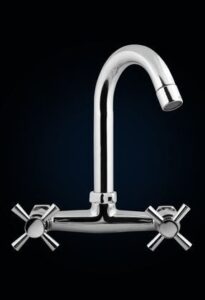Choosing appropriate faucets for your kitchen sink is as important as choosing the shape and size of the bowl. Faucets come in all shapes and sizes. Avoid a tiny faucet on a big, bold sink, and vice-versa. Be sure that the faucet you have chosen directs water into the center of the bowl. Also, make sure your new faucet matches the correct hole drillings in your sink.

Faucets come with one or two handles. With one handle, you have the convenience of controlling water temperature and volume with just one hand. Two-handled faucets offer more styles and spout designs. Look for a long-lasting, low maintenance finish to complement your decor.
The most important aspect to look for in a faucet is its durability — how long it will last without dripping? Faucets should perform for a long time and be drip-free for life.
A faucet must have anti-scald features such as hot-limit safety stops, pressure-balancing valves to protect users from drastic temperature changes and thermostatic valves that allow users to select a favorite temperature on an easy-to-read dial.
You can purchase a faucet that requires one hole (single-handle), or three holes (separate hot and cold handle). However, if you are planning on purchasing an accessory as well, such as vegetable spray, soap dispenser, or hot water dispenser, they each require a separate hole.
Faucets come with various features such as pull-out faucets, widespread faucets, bar faucets, and wall-mounted faucets. You can choose faucets based on functionality, size, finish, spigot, or handles.
When deciding between different types of kitchen faucets, consider design compatibility with other hardware in the room, as well as how you use your sink.
One easy way to identify the different types of kitchen faucets is by the material from which they are constructed. Stainless steel and chrome are popular choices since they can be shined to a high polish, looking sleek and contemporary. For a more traditional style there are nickel, brass and copper faucets











